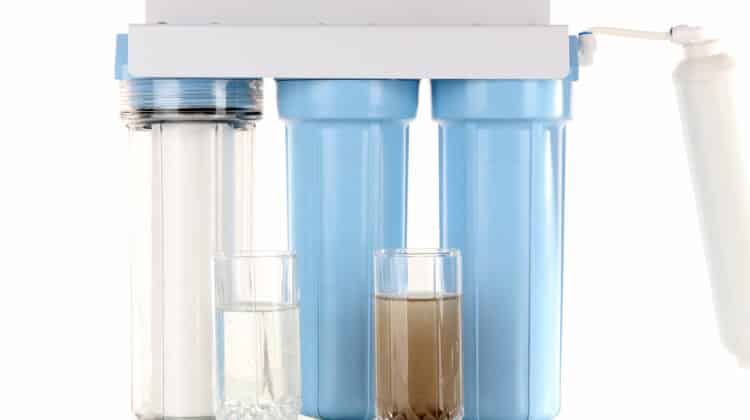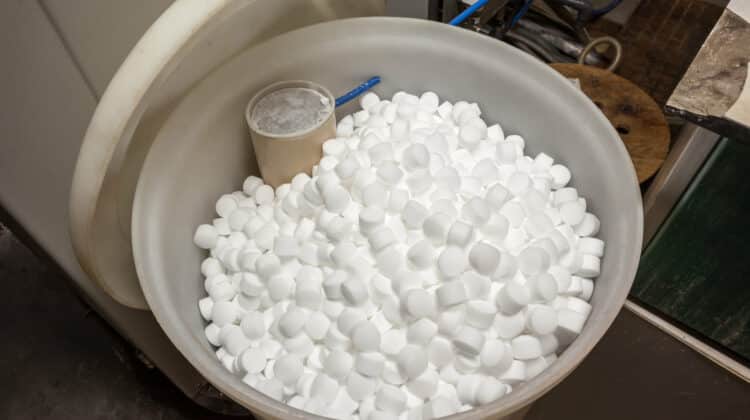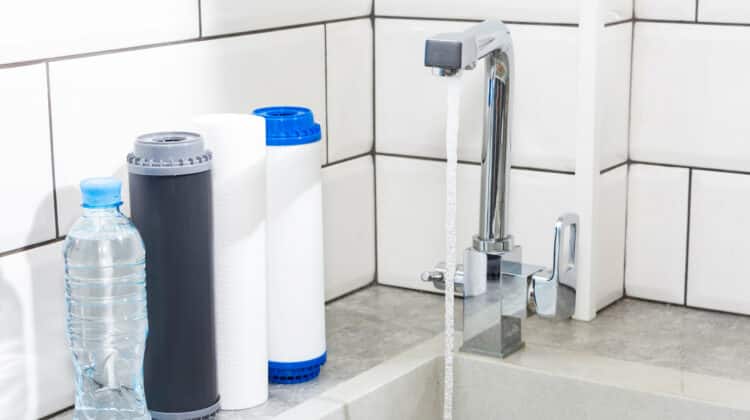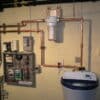
A water softener and a water filter are both water treatment devices. They rid your water supply of elements that you do not want for one reason or another. But each one does that job in its own way. The water softener vs water filter worry is a common among persons who have issues with their water. You’re not alone.
The truth is there are many differences between the two, even if they have similar jobs. That is why, sometimes, trying to figure out which you should get can be confusing.
We want to simplify this task for you.
Our water softener vs water filter guide gives you everything you need to know.
So, if you are ready to get a home system to treat your water, you are in the right place. We also included some Frequently Asked questions at the end of this article.
Before we dive into the topic, there is something I would like to clarify. It has to do with water filters and water purifiers. These devices, although similar, are not the same.
So, what is the difference between water purification and filtration?
Table of Contents
Water Filters
Water filters make water cleaner by removing certain impurities. You can do that with a homemade filtering system.
Filters only remove impurities like sand, sediments, and living organisms from your water. So, while the water might look cleaner, there may be other contaminants in it.
Water filters do not get rid of any chemicals or viruses that may be in your household water supply.
Water Purifiers
Water purifiers do an almost similar job to water filters. They also remove impurities from your water supply. But, they do a better job of it.
Water purifiers focus on the general safety of your water and not just a part of it.
They treat your water by removing bacteria and biological contaminants. They get rid of chemicals, viruses, and even other threats we cannot see from the water supply in your homes.
With water purification systems, your water will not only look cleaner. It will be cleaner and safer to drink as well.
If the quality of your drinking water concerns you, here’s what you can do. Try finding a water treatment system capable of doing all the above.
Now that you know the difference between filter and purifier, we can move on to our discussion today.
Are Water Softeners And Water Filters Different?
Water softeners and water filters both treat your household water supply. They improve the water provided by your water supplier to a standard that you prefer. But, they do that job in different ways. And then there are hybrid systems that do the job of both.
What Is The Difference Between A Water Softener And Water Filter
Water Softeners
The majority of the US population (85%) have hard water problems. Water hardness refers to how much magnesium and calcium there is in your water.
Now, magnesium and calcium are minerals that are good for us. But they have adverse effects on pipes, appliances, and water heaters. Treating these effects can cost you a lot of money. They also affect the skin, hair, clothes, and other things in our homes.
That’s where water softeners come in.
Water softeners treat your home water suppliers by getting rid of the hardness in your water. They prevent limescale from building up in pipes, sinks, faucets, and appliances.
Using a water softener keeps your skin from being dry and itchy after a bath. They keep your hair soft and moisturized to prevent breakage. They keep ugly stains and water spots off surfaces in your home. They keep your clothes looking brighter longer. And, they stop the buildup of soap scum on your bathroom walls.
Water Filters
Water filters get rid of unwanted compounds in your water. Those compounds include:
-
- dirt
- sediments
- living organisms
Those living organisms include parasites and bacteria.
-
- Metals
These metals include arsenic, copper, lead, cadmium, hexavalent chromium, and iron.
-
- Byproducts from pharmacies and industries
byproducts may be pesticides and hormones. Nobody wants those in their water.
-
- Chlorine
- Chloramine
- Perfluorooctane Sulfonate (PFOs) and Perfluorooctanoic Acid (PFOA)
These are man-made chemicals that pose health risks to humans.
Water filters can also take away foul odors and the bad taste that comes with having hard water.
Types Of Water Softeners
In the strictest sense of the word, I suppose a water softener is a type of filter. That’s because it removes unwanted elements from your water supply.
There are also different types of water softeners. There are water softeners that are not softeners at all. We will get into what I mean by that in a bit. First, let’s take a look at salt-based water softeners.
Salt-based Water Softener Devices
Salt-based softeners use an ion-exchange process to soften water.
Water softeners use ion-exchange resin beads to clean your water. They use salt to remove minerals from your water that cause hard water problems.
The beads are inside what we call the media tank. When water enters that tank, mineral deposits stick to those resin beads. So the water that flows through your pipe is free of hardness.
But, the resin beads reach capacity. After about 5 to 7 days they need cleaning. Otherwise, they can no longer treat your water. That’s where the salt comes in.
The brine tank of your water softener has a lot of salt and water. The two mix, creating a brine solution. During the cleaning or regeneration process, the brine solution washes the resin beads. The mineral deposits come loose and flow out through the drain.
No-Salt Water Softeners
Earlier I mentioned water softeners that do not soften water. These are the kinds to which I am referring. They do not use salt or resin beads. They also do not remove the minerals that cause water hardness from your water.
What do they do?
These systems condition your water. Hence the reason they have the name water conditioners instead of softeners. They do that by changing what is in your water. But we will get back to that in a bit.
They prevent mineral deposits from sticking to your pipes. So in a way, they do solve your water hardness problems.
A conditioner is a type of filter that improves your water quality. There are three types.
Carbon Filtration
These types of conditioners use activated carbon to absorb chemicals in your water. They remove the sulfur that gives hard water a bad smell and taste. They also get rid of chlorine in well and city water.
We mentioned carbon filtration earlier. It is a method used in water filters to improve water quality. And it is one of the good filters. So, you can find a softener with a carbon filter.
Electromagnetic
These conditioners work in one of two ways. The first way uses wires which wrap around pipes and breaks carbonate salt particles. The broken salt particles reduce the mineral deposits in the water. I want to refer to how salt-based softeners use salt to soften water. So, in a sense, water conditioners do soften water.
Catalytic Media Conditioners
You may hear the term salt-free associated with these conditioners. They use a crystallization method called template-assisted or TAC. With this method, mineral hardness changes to a form that does not stick to surfaces.
They do not reduce water hardness. But, catalytic conditioners solve all the problems that come with water hardness. It is also good that they filter your water.
Conditioners also act as water purifiers. They remove a lot of contaminants from the water. But they do not treat a lot of water at a time.
Types of Water Filters
There are quite a few types of water filters. Each one uses a different kind of process to filter water. We can’t get into every detail about these filters. What we will do is provide some general information about the way they work.
The kinds of filters available are:
Activated Carbon filters
These types of filters remove, chlorine, sediments, and other contaminants from water. It does that by absorbing these contaminants. into a pore structure made of a carbon substrate.
Reverse Osmosis
These types of filters use pressure to remove impurities from water. The pressure forces water to flow through a semi-permeable layer in the filter. That layer traps the contaminants and flushes them away. So, you end up with clean drinking water.
Alkaline Filters
An alkaline filter uses electrolysis to filter water. An ionizer increases the PH level of the water passing through this system. Makers of this device say that incoming water separates into two components. One component is acidic, and the other is alkaline.
But there is talk that these filters do not make drinking water safe.
UV Filters
UV filters work using ultraviolet radiation to destroy bacteria.
From this, we learn that there are many water purification techniques. But the three most common methods are:
- Reverse osmosis
- Activated carbon
- sediment filtration
Let’s move on to our next segment on water filters before we get to water softeners.
You see how there are different types of filters, there are also various places that you can install them in your home.
Whole House
These types of filters are installed at the point of entry in your house. So, every at your home has filtered water.
Under The Sink
As the name suggests, under the sink filter systems go under the sink. An under-the-sink filtration system is not a point of entry system. It is a point-of-use system. That means you place one under each sink in your house if you want.
Most people use reverse osmosis under the sink filtration systems in their kitchen.
Countertop
You attach these filters to a faucet using a water line. These are also popular filters because they are easy to install. It also helps that they are maintenance-free.
Faucet-mounted
Another type of water filter on the market is the kind that you secure to the mouth of your faucet.
Water Pitchers.
Water pitchers come with one of two ways to filter water.
Physical filtration
Water flows through a layer that looks like gauze. When that happens, the gauze-like layer removes large components from the water.
Chemical Filtration
Smart technology removes impurities from your water.
Now you have all these facts to help you guide you through the water softener vs water filter. Let’s move on to our FAQs section.
Does A Water Filter Help With Hard Water?
When it comes to a water softener vs water filtration system, water softeners have a simpler job. That’s because the areas that water softeners deal with do not have the potential to get us sick.
But, what simple water filters cannot do, is remove the minerals that cause water hardness. If you want to solve your water hardness problems and filter your water, you need a device that can do both.
Do I need A Water Softener Or Water Filter?
The answer to that question depends on a few things. The first thing you need to know is if you have hard water. To find out if the water where you live is hard, you can do a water test at home. You can also contact your water supplier for a report on the quality of your water. They should also be able to tell you what type of system you should get.
Does A Water Filter Help With Hard Water Problems?
Some water filters do both jobs. They soften water and remove other pollutants from your water supply.
Others do only one of these.
If you have hard water problems and also need a softener, you can find one that does both.
Does Reverse Osmosis Remove Hardness From Water?
Reverse osmosis filtration systems filter water as well as soften water. It not hard to understand why it is one of the better filters on the market.
Is There A Water Softener That Also Removes Chlorine?
Water softeners do not have the capacity to remove chlorine from your water.
Is A Water Conditioner The Same As A Water Softener?
I think the answer to that question is twofold. It is both yes and no. Yes, because both water softeners and conditioners treat hardness in your water. But the answer is also no because they do not use the same methods. While water softeners get rid of hardness causing-minerals water softeners reverse the effects of these minerals.
Conditioners change the minerals that cause water hardness to improve water quality. Softeners get rid of the minerals the cause water hardness using a lot of salt.
Conclusion
Whether you decide to get a softener, conditioner, purifier, or filter is a personal choice. It depends on what you need and what you prefer. But there are water treatment systems available with two in one capability.
It does not need to be about ‘water softener vs water’ filter when it is possible to have the best of both.





